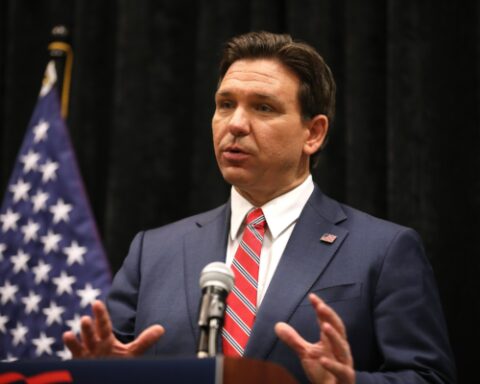In a recent appearance on America’s Newsroom, Florida Governor Ron DeSantis articulated his rationale for banning fluoride from the state’s public drinking water.
Framing the decision as part of his broader “Make America Healthy Again” initiative, DeSantis characterized the addition of fluoride to water supplies as a form of “forced medication.”
The controversial measure has sparked considerable debate among public health officials and residents alike. Supporters of fluoridation argue that it plays a crucial role in preventing dental cavities, particularly for children.
They assert that community water fluoridation has been endorsed by numerous health organizations, including the Centers for Disease Control and Prevention (CDC) and the American Dental Association (ADA), as a safe and effective method to promote oral health.
However, DeSantis and his allies contend that individuals should have the autonomy to choose whether or not to ingest fluoride. “We should not be forcing medication on people without their consent,” he declared, emphasizing personal choice in health matters.
This viewpoint resonates with a segment of the population that is increasingly wary of government intervention in personal health decisions.
The governor’s comments come in the context of a larger political landscape where health mandates, particularly those imposed during the COVID-19 pandemic, have become flashpoints in the ongoing culture wars.
DeSantis has previously positioned himself as a staunch opponent of pandemic-related restrictions, advocating for individual freedoms and state autonomy.
Critics of the fluoride ban express concern that the decision could have detrimental effects on public health, particularly among vulnerable populations.
Dental health advocates warn that eliminating fluoride from drinking water could exacerbate existing disparities in oral health, disproportionately affecting low-income families who may lack access to dental care.
The ban aligns with DeSantis’s broader legislative efforts, which include a recent bill aimed at combating “swatting”—the act of making false emergency reports to provoke police responses.
By connecting these issues, DeSantis seeks to portray his administration as proactive in addressing both health and public safety concerns.
As the debate continues, public opinion remains divided. Some residents applaud the governor’s stance, viewing it as a necessary pushback against government overreach, while others fear that the move could undermine decades of progress in dental health.
DeSantis’s decision is emblematic of a growing trend among certain political leaders to challenge established public health practices, raising questions about the balance between personal choice and community health.
As the state moves forward with the ban, its implications for public health policy and individual rights will likely remain at the forefront of political discourse in Florida and beyond.
[READ MORE: Musk Claims He Will Pull Back Significantly From Political Spending]







